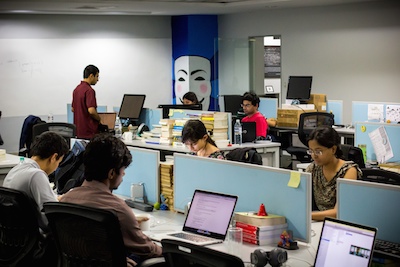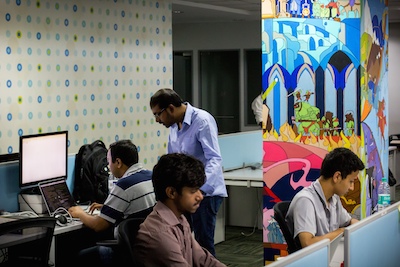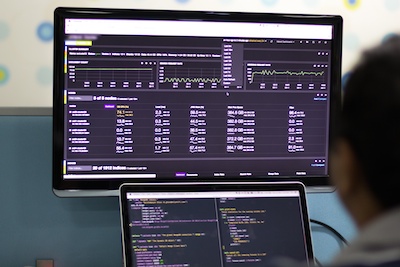Interview with Baishampayan Ghose, Co-Founder & CTO - Helpshift
In our exclusive interview with Mr. Baishampayan Ghose aka BeeGee, we discuss about his growing up years, his academic background, Indian education system, engineering, innovation and more. Read on to see what BG has to say about Helpshift and fill your engines with ideas and food-for-thought to make your next big startup come to life!

1. Helpshift claims to be the first embedded support desk for native apps. Please share the details of your product.
BG: The world is quickly becoming all-mobile. Today we don't use websites as much as we use mobile apps, be it games, news, productivity or just entertainment. As such, we are discovering new ways of monetization which are quite different from traditional models, like in-app purchases. This also warrants a different approach towards servicing your customers---the traditional email based customer support doesn't cut it any more. Helpshift is the industry-leading product for providing customer service to mobile customers. We have an SDK tailored for all dominant mobile platforms along with an admin dashboard that a company can use to help out their customers. So far Helpshift has been immensely successful in driving value to our customers and the new features that we're coming up with are guaranteed to give our customers even more insights as to how people are using their apps and how they can retain their users.
2. Could you tell us more about your growing up years and educational background?
BG: I grew up in Agartala, Tripura (it's in North East India, in case people don't know). I spent my childhood taking things apart (and sometimes putting them back), reading books and thinking about building stuff. At that moment even though I was pretty confident that I was going to become an Engineer of some sort (mostly owing to a huge amount of influence from my maternal uncle, an engineer extraordinaire), I didn't have much exposure to computers. I did get acquainted to computers at a later stage though, but my journey started when I got into college. The college I got into for my BE (CS) course was just like any other Indian engineering college and as you can guess was not much of an inspiration. So I took charge of my education and took two years off from college and spent all my time studying Computer Science from the very basics. Those two years were really important for my life; learning aside, I got involved with the international Free & Open Source Software community and got acquainted with the "softer" sides of software engineering; collaboration, understanding people, managing expectations, etc. After I finally graduated I got a job at one of India's premier travel startups and that's where my startup journey started.
3. You have been the co-founder of various organizations like Paisa.com, oCricket.com, Mumbai Python Users Group. You have also worked as a software engineer prior to these organizations. How has your past experience helped to become a successful entrepreneur?
BG: Entrepreneurship is not as much about programming as it's about people. Your teammates are people, your customers are people and your investors are people too! I think my experience in dealing with all kinds of people in different communities (FOSS or not) gave me a very balanced perspective towards understanding people and surely helped me a lot in my entrepreneurial journey.
4. How do you think has engineering helped you and Helpshift to be what it is today?
BG:
Startups are all about crafting solutions given a finite supply of raw materials within some known (and unknown) constraints. Well, that's the very essence of engineering as well! Apart from just raw skills, I think it's the engineering mindset that comes in very handy when you're in a startup.There are so many problems to solve, but with little resources. That indeed is quite a challenging engineering problem and an aptitude towards engineering does help. Having said that, startups can also end up frustrating some engineers because we tend to expect a certain level of predictability in what we do and in the startup world things are often completely unpredictable. The bottom-line is that some engineering aptitude surely helps but we need to balance it with some real-world pragmatism.
5. The world needs more innovations. What is your take on present education system?
BG: The Indian education system is in shambles at the moment, but it'd be incorrect to blame the education system in isolation alone. After all, an education system ultimately reflects the thought process of the society at large and to solve the "problem" with education we need to dig deeper. To me, the biggest issue is the "job-oriented" mentality of Indians that holds us back. Centuries of oppression and brain-washing has stifled our creativity in such a way that we're today scared of doing anything that's out of the ordinary. Thousands of years back Indians were contemplating the nature of the universe and were manipulating abstractions like zero or infinity. We were not constrained by social pressure then. No one was forcing us to "get a job"; we're free to be creative on our own. I think we need to bring back those times again. Instead of building institutions that promise to build the best engineers or managers we should build academies that teach people to think on their own. That, I think is the core foundation that everyone deserves and afterwards people can find their own path instead of applying a "proven" formula. Instead of reaching into our own creative potential if we keep on evaluating ourselves by oversimplified and superficial metrics like marks, certificates, etc then we're bound to be mediocre at best. Having said that, we can't wait for the institutions to evolve unless we ourselves are able to articulate our needs. Given the circumstances, I believe people should take charge of their own education and just educate themselves. This is the age of the Internet, information is not hard to get by. Go join a MOOC, read a book, find a mentor, do something.



The Helpshift Office
6. In July 2013 Helpshift won the VentureBeat MobileBeat Innovation Showdown. How has this contributed to the growth of Helpshift?
BG: Awards and recognition help, they affirm that you're probably doing something right. It's a huge validation. At the same time, the goal is to keep our heads down and keep innovating; we can't rest until we've solved the problems of our customers completely.
7. For any wannabe entrepreneur, the biggest fear is the fear of failure. What should one do to overcome it?
BG: It all depends on how you define "failure".
I have this mantra - "Startups fail, entrepreneurs just emerge with more wisdom." I think a startup can teach you things that a big company can't do and even if you fail the knowledge is invaluable.A failed startup founder can always go back to a job if they wish to, but not everyone can do a startup. In short, if you want to be an entrepreneur you can't be scared of failure and if you are, you should probably keep that job.
8. Who are your customers? Where do you see Helpshift five years down the lane?
BG: We have a lot of customers in various verticals. To name a few we're helping Flipboard, Circa, Pixelberry Studios, Flipkart, any many other app companies from all over the world. In 5 years? Well, I am not much into making predictions; my focus is on the here and now with just an inkling of what can come in the future. The market opportunity is huge; but execution will matter.
9. Thank you for your time. Any message for our readers?
BG: Thanks Guneet. I have already said a lot, so I would just urge the readers to figure out what they want to do in their lives and put all their energy in executing that vision. If any of the readers has questions they can email me. I can be reached on Twitter (@ghoseb) and other contact info is on my website - <a href="https://freegeek.in/" target="_blank" rel="nofollow noopener noreferrer">Baishampayan Ghose | Freegeek!</a>
